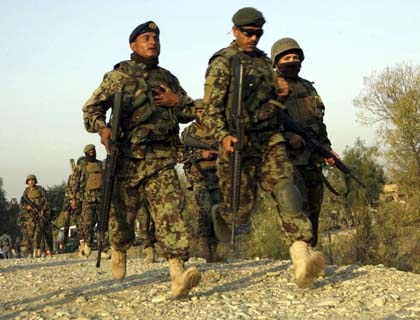A man in an Afghan army uniform shot and killed two British soldiers Monday inside a NATO base in southern part of the country. The attack added to the latest series of attacks on international security forces by Afghan associates. Reportedly, the gunman was shot and killed. In the past few years, attacks carried out by individuals in uniform have increased visibly which have also distorted both Afghan National Army (ANA) and Afghan National Police's (ANP) prestige.
Since 2007, such incidents have become so common and do not come as surprise for foreign or Afghan officials. Attacks by Afghan security forces have resulted in the deaths of more than 75 NATO soldiers and wounding of more than 110 others. The situation has got further complicated after two horrific incidents——burning of Holy Quran in Bagram Airfield and shooting of civilians by an American soldier in Panjwae district of Kandahar Province which both have sparked anti-western sentiments.
Anti foreign sentiments have deep roots in the history of Afghanistan. All those who tried to occupy this territory encountered severe resistance and finally just retreated. Both Great Britain and USSR emperors after paying huge human and economic costs failed to bring these people under their control. Both Great Britain and USSR were defeated and took corpses of thousands of their soldiers. No matter how strong they were, the only thing that made them retreat was the nationwide spontaneous movement.
It is important to be noticed that though some branded this land as the graveyard of emperors, but it was much suitable to be called the "graveyard of foreign emperors" because during history some monarchs, ruling this people, were emperors and had vast territories of the surroundings under the control. They faced no potential danger from inside of the country. Even if some kinds of uprising broke out, they were able to suppress rebellions by regular security forces or through recruitments, mainly from rival tribal or ethnic groups.
Playing similar scenario has been hardly possible by a foreign force though some occupiers did try to enforce the policy of "divide and rule". And the policy worked in particular times, but generally failed because Afghans spontaneously became united against a force which had nothing in common with residents of this particular geographical area. In no time, ethnic groups, who were in lasting conflict with each other and tribal groups that have been shedding bloods of each other, have come together, vowed as brothers and joint hands to force out the so-called occupiers.
Unfortunately, after defeating enemies, the people once again turned to the very first place from where they started—A broken national tie and once again turning arms toward one another. The tribal and communal struggle existed during past centuries with different levels of intensity. Sometimes, it turned harsh and remained mildly tense, on some other period.
If an individual from a particular community succeeded to take political power, he discriminated against members of other community or even tried to erase the rival community completely. Just put a glimpse to the history and read about human tragedy that took place in the central part of the country in 19th century or massacre committed by Taliban regime in Mazar-e-Sharif and Bamyan. Indubitably, they were made on the lines of community and ethnicity.
With all such communal animosity, Afghan people during history, when needed, have put aside all differences and united against interferers or occupiers. The most clear exaple was seen in the case of soviet armies in 1979. Perhaps, without government employees and those opportunists seeking for personal interests through tricking common people, all sects and community took part in anti-soviet resistance, which finally led to its defeat. However, it does not mean to ignore the critical role of western countries with vested interests and Muslim countries, pouring cash and trafficking weapons in order to make the civilian movement succeed, rather means Afghan people would hold fight against soviet armies with or without the support of other forces though they might have gotten suppressed or failed to achieve their objectives. What is important is this they cannot tolerate their country under the power of a second country.
So, what about the current situation? Where this process may end? Will US face similar destiny as the ongoing anti-insurgency struggle has changed more to an American ant-terrorism combat?
Before answering the question something should be noticed. Firstly, the current international engagement differs from unwanted USSR military intervention Secondly, the political conscience and awareness is not comparable to decades of 70's and 80's. Thirdly, there is no third potential power to fuel tension against US and its allies. Fourthly, Afghan people are generally thankful of US for ending to the most oppressive regime.
ifthly, current military engagement is viewed as friendly intervention for humanitarian assistance rather than getting strategic, economic and political benefits. Sixthly, people are worried about the consequence of sudden or early withdrawal of foreign forces. Seventhly, people are tired of instability and security crisis. Eighthly, there is no alternative and untried force to gain the attention and trust of people.
With the mentioned differences, similar anti-foreign movement is far-fetched. But there is one thing that should be noticed that is linked to Taliban militants. Afghan people increasingly turning disappointed and find their hopes like drawing on water. Nobody forecasted the international military engagement lasts too long. They are increasingly becoming in view that foreign forces cannot bring peace and stability and, therefore, they should leave the country.
Moreover, the two incidents of Bagram and Panjwae have further disturbed our relation with foreign allies. Taliban militants have exploited the situation and succeeded to inflame the sentiments of civilians as observed in the case of series attacks non-Taliban elements.
Though the situation is inconvenient for foreigners, it is hardly possible that a eruption of anti-foreign sentiments occurs once again.

